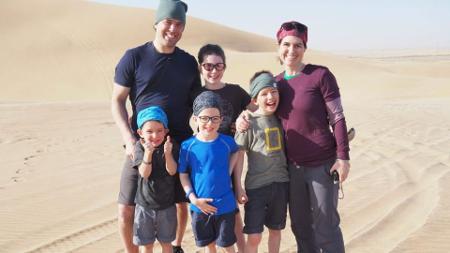Canadian couple Edith Lemay and Sebastien Pelletier noticed that their 1-year-old daughter, Mia, had vision problems. A few years after taking him to a specialist, he was diagnosed with retinitis pigmentosa, a rare genetic condition that causes vision loss or a decrease over time.
Now 7-year-old Colin and 5-year-old Laurent had the same symptoms and in 2019 they discovered a genetic disorder. It was then that the couple decided to spend a year traveling the world with their children.
“There’s really nothing we can do,” Lemay says, explaining that there is currently no cure or effective treatment that will slow the progression of retinitis pigmentosa. The fourth of their children, Leo, now 9 years old, is the only one without the condition.
“We don’t know how soon that will happen, but we expect them to go completely blind by middle age,” the parents tell CNN.
“It’s not just the scenery they’ll remember, but the different cultures and people.”
Lemay, mother of the children
After dealing with the news, the couple focused their attention on helping their children develop the skills they need to live.
When Mia’s specialist suggested absorbing it with “visual memories,” Lemay realized there was a way to do it for herself and her children.
“I thought, ‘I’m not going to show an elephant in the book, I’m going to take him to see a real elephant,'” she explains. “And I will fill his visual memory with the best and most beautiful images I can.”
Although Lemay and Pelletier often traveled together and took their children on several trips before becoming parents, a long family trip had not previously seemed possible. “We have an urgency with the diagnosis,” adds Pelletier, who works in finance. “There are great things to do at home but nothing better than traveling,” she says.
Family saves money for travel
The family began to collect their savings, and the idea of travel received a positive boost when the company where Pelletier worked and owned was acquired. “It was like a little gift from life,” admits Lemay.
The family of six was due to leave in July 2020 and had planned an itinerary with Russia and China. But the pandemic delayed the plans.
When they finally left Montreal in March 2022, they had several goals. “We left without an itinerary. We had ideas of where we wanted to go, but we planned it while we were traveling. Maybe a month in advance.”
The family made a list: for example, Mia wanted to ride a horse and Laurent wanted to drink juice on a camel. “It was really specific and really funny,” he adds.
They started their journey through Namibia, where they saw elephants, zebras, and giraffes, then moved on to Zambia and Tanzania. Then they stayed in Turkey for a month and went to Mongolia and Indonesia.
“We focus a lot on fauna and flora. We’ve seen amazing animals in Africa and Turkey as well. We’re really trying to get our kids to see things they can’t see at home. Of course, have the most amazing experiences.”
Mia, now 12 years old, has known about her condition since she was seven years old. Colin and Laurent recently found out and started asking tough questions. Lemay said, “My son said to me, ‘Mom, what does it mean to be blind? Will I be driving?’ “It was heartbreaking.”
Lemay and Pelletier acknowledge that the diagnosis is always on their minds, but they focus on living in the moment and “spending their energies on positive things.”
As the family plans to return to Quebec in March 2023, they say they are trying not to think too far ahead. In fact, the ability to live in the moment is one of the most important things the family has learned in recent months. “This trip has opened our eyes to so many other things, and we really want to enjoy what we have and the people around us,” Pelletier says.
Pelletier emphasizes that they are hopeful that Mia, Colin and Laurent will never go blind. But for now, they are doing everything they can to make sure they can handle whatever happens in the future. “We hope science will find a solution,” Pelletier says. “We’ve discussed this, but we know it can happen, so we want to make sure our kids are ready to face these challenges. They’re going to need to be really resilient throughout their lives.”
By National eyelash instituteUSA, symptoms of retinitis pigmented It starts in childhood and most people lose most of their eyesight. The condition is hereditary.
source: Noticias

